Innovation on the Internet is driving businesses to look for faster and more cost-effective ways to build applications. Node.js, a runtime environment and library for running applications written in JavaScript outside the browser, has emerged in the last few years and has really benefit from this necessity. One of the advantages is straightforward: if you combine Node.js with other client-side JavaScript libraries such as AngularJS, you can use only JavaScript to develop both the server and the client sides of your Web Application.
Thus, you'll probably need a smaller team of JavaScript developers to quickly take your idea from paper to an available product in the market. But Node.js is not just for startups. PayPal, Yahoo and Microsoft are examples of bigger companies that are actively and openly using Node.js in their infrastructures.
If you have been around in the last few years in the Web Development world, you know for sure the acronym LAMP. Now, you have MEAN, which stands for MongoDB, Express.js, AngularJS and Node.js. In this development stack, JavaScript, and its sidekick JSON, go all the way, from having JSON stored in the database (i.e. MongoDB), Node.js for building server-side applications using JavaScript and JSON, Express.js, the Node.js framework for building Web Applications, and AngularJS, an open-source MVC framework for client-side JavaScript, which is backed by Google. Joyent is the name behind the creation of Node.js. They also provide private clouds using Node.js stacks.
There's a problem however that might scare off some of the potential Node.js and JavaScript adopters: the fact that the code is stored both on the client and server as clear text files. You may consider this a problem if you host your code on a shared server that others have access to, or if you are selling your code to third parties and you lose control of whom gets access to your original source code.
One solution is to avoid the problem altogether, by not betting in rich client side code, and forbid yourself from sharing hosts or sharing code at all. But that is kind of silly. The cloud brought a gazillion services you'll want to integrate with and the Web is basically a giant mashup of code. Even where you'll run some JavaScript you are developing is becoming a blur. You may write it as a server-side module, but tomorrow you may decide to run it on the client side. And that's good. We accomplish more things and quicker today than a few years ago. The other solution is to use JavaScript obfuscation to make your code as protected as possible.
"JScrambler uses source code obfuscation techniques to transform your code into a completely garbled format. On top of that, it installs a number of different code traps that gives your code tools to protect it. For instance, it can make your code detect tampering and break down on purpose" - said Pedro Fortuna, JScrambler's CTO. In the end of the day, you can reduce piracy drastically, stop competitors from snooping your code and reusing it, or avoid IP legal disputes.
The newest version of JScrambler introduces Node.js support. With this, the platform comes full circle, becoming the one solution that is able to protect anything with JavaScript. This release was fully tested with Node.js related libraries such as Express.js, Koa and Socket.io. Plus, it conveniently ships with a Node.js API client, with wrappers for Grunt and Gulp task runners, and a convenient plugin for the Github's Atom editor. "We tried other solutions & tools before choosing JScrambler. The level of protection combined with excellent support and frequent updates is something we value very much.", said Hannu Alakangas, CEO of Punos Mobile Ltd.
Obviously, not everyone will feel the need to protect his code. But if you are doing serious things with JavaScript, have a look at JScrambler. It is now the only full stack JavaScript protection solution and the only one that supports Node.js. So, before you deploy your application and run into a Web standoff with hackers or code thieves, make sure you've checked all your options.
JScrambler has been around for almost five years, having so far protected around 150 million lines of JavaScript for users in more than 100 countries. They've just got Series A funding in the beginning of this year and is now expanding its operations to the US. In 2013 it won the Eurocloud Best Cloud Startup Award, in Portugal.


